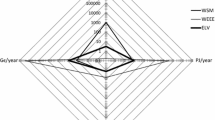Abstract
Market-driven industrial recycling can only be optimized if recycling companies adopt a comprehensive overview and are able to combine and integrate economics with the system engineering of interconnected recycling systems. To succeed in this endeavor, the companies require detailed knowledge of the interaction between the process/quality control, physics, and chemistry of separation technology, and legislation on the materials they are recycling as well as product design. This article summarizes the authors’ practical and fundamental approach to optimizing the resource cycle. The research is focused on areas in the resource cycle where the largest impact will be achieved, as suggested by system perspective and models.
Similar content being viewed by others
References
M.A. Reuter and A. van Schaik, “The Effect of Design on Recycling Rates for Cars—Theory and Practice” (Paper presented at the International Auto Recycling Conference, Geneva, Switzerland, March 2004).
M.B. Castro et al., “A Simulation Model of the Comminution-Liberation of Recycling Streams-Relationships between Product Design and the Liberation of Materials during Shredding” (Submitted to Minerals Engineering, 2004).
M.A. Reuter, Y. Xiao, and U. Boin, Keynote Address “Environmental Issues Concerning Recycling; and Slags, Salts, and Fluxes,” Proceedings Molten Slags, Salts and Fluxes (Cape Town, South Africa: SAIMM, 2004).
B. Castro and M.A. Reuter, “Decision Tree for Design Choices of Materials for Cars,” Resources, Conservation and Recycling, (2004) in press.
A. van Schaik and M.A. Reuter, “The Time-Varying Factors Influencing the Recycling Rate of Cars,” Resources, Conservation and Recycling, 40 (4) (2004) pp. 301–328.
A. van Schaik and M.A. Reuter, “The Influence of Particle Size Reduction and Liberation on the Recycling Rate of End-of-Life Vehicles, Minerals Engineering, (17) 2 (2004), pp. 331–347.
B.G. Castro, J.A.M. Remmerswal, and M.A. Reuter, “Life Cycle Impact Analysis of the Average Passenger Vehicle in the Netherlands.” International Journal of Life Cycle Assessment, 8 (5) (2003), pp. 297–304.
M.A. Reuter et al., “Pyrometallurgy—The Key to Sustainable Use of Materials,” Keynote Address, International Minerals Processing Congress 2003, vol. 1 (2003), pp. 128–149.
W.L. Dalmijn et al., “The Optimisation of the Resource Cycle Impact of the Combination of Technology, Legislation and Economy,” Keynote Address, International Minerals Processing Congress 2003, vol. 1 (2003), pp. 81–106.
M.A. Reuter et al., “Modelling the Relationship between Constructive Choices in Design and Resource Efficiency.” Proc. International Auto Recycling Conference (Muri, Switzerland: ICM AG, 2003), p. 25.
M.A. Reuter, J.J. Eksteen, and A. van Schaik, “Pyrometallurgical Reactors—Closers of the Material Cycle,” Yazawa International Symposium on Metallurgical and Materials Processing: Principles and Technologies. Vol. 1: Materials Processing Fundamentals and New Technologies, ed. F. Kongoli et al. (Warrendale, PA: TMS, 2003), pp. 1005–1018.
B. Zhou, Y. Yang, and M.A. Reuter, “Modelling of Melting Behavior of Aluminum Metal in Molten Salt and Metal Bath,” Yazawa International Symposium on Metallurgical and Materials Processing: Principles and Technologies, Vol. 1: Materials Processing Fundamentals and New Technologies, ed. F. Kongoli et al. (Warrendale, PA: TMS, 2003), pp. 1249–1258.
A. van Schaik et al., “Dynamic Modelling and Optimisation of the Resource Cycle of Passenger Vehicles,” Minerals Engineering, 15 (11) (2002), pp. 1001–1016.
Y. Xiao and M.A. Reuter, “Recycling of Different Aluminum Scraps,” Minerals Engineering 2002, 15 (IIS1) (2002), pp. 763–970.
B. Zhou, Y. Yang, and M.A. Reuter, “Study of Melting Behaviour of Aluminium Scraps in Molten Melts,” Recycling and Waste Treatment in Mineral and Metal Processing: Technical and Economic Aspects, ed. B. Björkman, C. Samuelsson, and J.-O. Wikström (Warrendale, PA: TMS, 2002), pp. 527–537.
M.A. Reuter, W.L. Dalmijn, and A. van Schaik, “Smart Product Systems,” Recycling International, No. 9 (2002), pp. 34–36.
W.L. Dalmijn, M.A. Reuter, and T.P.R. de Jong, “Recycling: The Role of Automation in the Resource Cycle,” Preprint (Paper presented at the 10th IFAC Symposium on Automation in Mining, Mineral and Metal Processing (MMM 2001)), pp. 8–18.
M.A. Reuter et al., “The Impact of Scrap Type and Melting Conditions on Metal Yield and Recovery,” Proceedings of EMC 2001, Volume 3 (GDMB: Clausthal-Zellerfeld, Germany, 2001), pp. 59–70.
W.L. Dalmijn, M.A. Reuter, and T.P.R. Jong, “Recycling: The Role of Automation in the Resource Cycle,” Preprint (Paper presented at the 10th IFAC Symposium on Automation in Mining, Mineral and Metal Processing (MMM 2001)).
Author information
Authors and Affiliations
Additional information
For more information, contact M.A. Reuter, Delft University of Technology, Mijnbouwstraat 120, 2628RX Delft, The Netherlands; e-mail m.a.reuter@citg.tudelft.nl.
Rights and permissions
About this article
Cite this article
Reuter, M.A., Boin, U., Rem, P. et al. The optimization of recycling: Integrating the resource, technological, and life cycles. JOM 56, 33–37 (2004). https://doi.org/10.1007/s11837-004-0178-3
Issue Date:
DOI: https://doi.org/10.1007/s11837-004-0178-3




